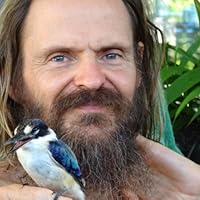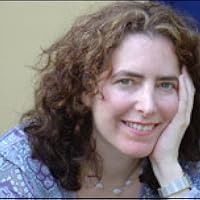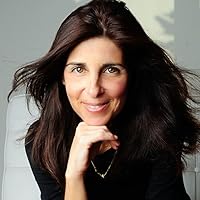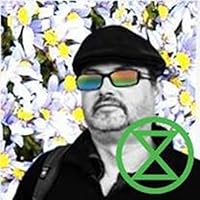Organic Food Quotes
Quotes tagged as "organic-food"
Showing 1-24 of 24

“[T]his readiness to assume the guilt for the threats to our environment is deceptively reassuring: We like to be guilty since, if we are guilty, it all depends on us. We pull the strings of the catastrophe, so we can also save ourselves simply by changing our lives. What is really hard for us (at least in the West) to accept is that we are reduced to the role of a passive observer who sits and watches what our fate will be. To avoid this impotence, we engage in frantic, obsessive activities. We recycle old paper, we buy organic food, we install long-lasting light bulbs—whatever—just so we can be sure that we are doing something. We make our individual contribution like the soccer fan who supports his team in front of a TV screen at home, shouting and jumping from his seat, in the belief that this will somehow influence the game's outcome.”
―
―

“The question isn't why organic food is so darned expensive, it's really about why chemically sprayed, poisoned food is so cheap.”
― The Eden Fruitarian Guidebook
― The Eden Fruitarian Guidebook

“Animals who are exploited for “organic” foods are raised, maintained, transported, and slaughtered just like their nonorganic” counterparts: They are debeaked, dehorned, detoed, castrated, and/or branded, and they are kept, transported, and slaughtered in the same deplorable conditions.”
― Speaking Up for Animals: An Anthology of Women's Voices
― Speaking Up for Animals: An Anthology of Women's Voices
“I hope that, someday, grocery stores carry only permaculture food because the farmers make more money growing permaculture foods”
― Building a Better World in Your Backyard - Instead of Being Angry at Bad Guys
― Building a Better World in Your Backyard - Instead of Being Angry at Bad Guys

“Then they start going on about cancer and how organic living is the way forward, totally ignoring how expensive it is to be organic and that there are a lot of people out there grateful if they can afford regular living.”
― The Death of Bees
― The Death of Bees

“Fresh corn tastes better than canned corn, and who knew? So if you want to pay extra for that, great. Be our guest. But quit acting like it is a ‘conscience and responsibility’ thing, because canned corn is nutritionally better than no corn.(p. 91).”
― Confessions of a Food Catholic
― Confessions of a Food Catholic

“To grow the plants and animals that made up my meal, no pesticides found their way into any farmworker’s bloodstream, no nitrogen runoff or growth hormones seeped into the watershed, no soils were poisoned, no antibiotics were squandered, no subsidy checks were written. If the high price of my all-organic meal is weighed against the comparatively low price it exacted from the larger world, as it should be, it begins to look, at least in karmic terms, like a real bargain.”
― The Omnivore's Dilemma: A Natural History of Four Meals
― The Omnivore's Dilemma: A Natural History of Four Meals
“corporations buy up and own smaller companies and use the same ingredients. The smaller company brands are often the ones marketed as healthy and natural. The average consumer does not always recognize this tactic and is unable to make well-informed purchases.”
― GMO Free Diet: How to Stay Healthy by Identifying and Avoiding Dangerous Foods
― GMO Free Diet: How to Stay Healthy by Identifying and Avoiding Dangerous Foods

“She thinks of Stanley's colored pencil drawings of theoretical businesses: a cafe, a bookshop, and, always, a grocery store. When she was ten and he was fourteen, he was already working as a bag boy at Publix, reading what their father called "hippie books." He talked about stuff like citrus canker, the Big Sugar mafia, and genetically modified foods and organisms. He got his store manager to order organic butter after Stanley'd read (in the 'Berkeley Wellness' newsletter) about the high concentration of pesticides in dairy. Then, for weeks, the expensive stuff (twice as much as regular) sat in the case, untouched. So Stanley used his own savings to buy the remaining inventory and stashed in his mother's cold storage. He took some butter to his school principal and spoke passionately about the health benefits of organic dairy: they bought a case for the cafeteria. He ordered more butter directly from the dairy co-operative and sold some to the Cuban-French bakery in the Gables, then sold some more from a big cooler at the Coconut Grove farmer's market. He started making a profit and people came back to him, asking for milk and ice cream. The experience changed Stanley- he was sometimes a little weird and pompous and intense before, but somehow, he began to seem cool and worldly.”
― Birds of Paradise
― Birds of Paradise

“I mean, he could blow old Capitalist-Stevie here away."
Felice doesn't respond. She pulls the backs of her ankles in close to her butt and rests her chin on the flat of one her knees. She thinks of Stanley's colored pencil drawings of theoretical businesses: a cafe, a bookshop, and, always, a grocery store. When she was ten and he was fourteen, he was already working as a bag boy at Publix, reading what their father called "hippie books." He talked about stuff like citrus canker, the Big Sugar mafia, and genetically modified foods and organisms. He got his store manager to order organic butter after Stanley'd read (in the 'Berkeley Wellness' newsletter) about the high concentration of pesticides in dairy. Then, for weeks, the expensive stuff (twice as much as regular) sat in the case, untouched. So Stanley used his own savings to buy the remaining inventory and stashed in his mother's cold storage. He took some butter to his school principal and spoke passionately about the health benefits of organic dairy: they bought a case for the cafeteria. He ordered more butter directly from the dairy co-operative and sold some to the Cuban-French bakery in the Gables, then sold some more from a big cooler at the Coconut Grove farmer's market. He started making a profit and people came back to him, asking for milk and ice cream. The experience changed Stanley- he was sometimes a little weird and pompous and intense before, but somehow, he began to seem cool and worldly.
Their mother, however, said she couldn't afford to use his ingredients in her business. They'd fought about it. Stanley said that Avis had never really supported him. Avis asked if it wasn't hypocritical of Stanley to talk about healthy eating while he was pushing butter. And Stanley replied that he'd learned from the master, that her entire business was based on the cultivation of expensive heart attacks.”
― Birds of Paradise
Felice doesn't respond. She pulls the backs of her ankles in close to her butt and rests her chin on the flat of one her knees. She thinks of Stanley's colored pencil drawings of theoretical businesses: a cafe, a bookshop, and, always, a grocery store. When she was ten and he was fourteen, he was already working as a bag boy at Publix, reading what their father called "hippie books." He talked about stuff like citrus canker, the Big Sugar mafia, and genetically modified foods and organisms. He got his store manager to order organic butter after Stanley'd read (in the 'Berkeley Wellness' newsletter) about the high concentration of pesticides in dairy. Then, for weeks, the expensive stuff (twice as much as regular) sat in the case, untouched. So Stanley used his own savings to buy the remaining inventory and stashed in his mother's cold storage. He took some butter to his school principal and spoke passionately about the health benefits of organic dairy: they bought a case for the cafeteria. He ordered more butter directly from the dairy co-operative and sold some to the Cuban-French bakery in the Gables, then sold some more from a big cooler at the Coconut Grove farmer's market. He started making a profit and people came back to him, asking for milk and ice cream. The experience changed Stanley- he was sometimes a little weird and pompous and intense before, but somehow, he began to seem cool and worldly.
Their mother, however, said she couldn't afford to use his ingredients in her business. They'd fought about it. Stanley said that Avis had never really supported him. Avis asked if it wasn't hypocritical of Stanley to talk about healthy eating while he was pushing butter. And Stanley replied that he'd learned from the master, that her entire business was based on the cultivation of expensive heart attacks.”
― Birds of Paradise

“He said wouldn't it be brilliant to have a food emporium on the ground floor of Fenton's, like Harrods, but have everything organic and locally grown." Diana paused to let the idea sink in.
"I said not the ground floor of course, Fenton's isn't a supermarket, but the basement has been a dead zone for years. A whole floor dedicated to stationery when no one writes letters anymore."
"A food emporium," Cassie repeated.
"Fresh fish caught in the bay, oysters, crab when it's in season. Counters of vegetables you only find in the farmers market, those cheeses they make in Sonoma that smell so bad they taste good. Wines from Napa Valley, Ghirardelli chocolates, sourdough bread, sauces made by Michael Mina and Thomas Keller. Everything locally produced. And maybe a long counter with stools so you could sample bread and cheese, cut fruit, sliced vegetables. Not a true cafe because we'd keep the one on the fourth floor. It would have more the feel of a food bazaar, with the salespeople wearing aprons and white caps."
Cassie closed her eyes and saw large baskets of vegetables, glass cases filled with goat cheese and baguettes, stands brimming with chocolate-covered strawberries.”
― Market Street
"I said not the ground floor of course, Fenton's isn't a supermarket, but the basement has been a dead zone for years. A whole floor dedicated to stationery when no one writes letters anymore."
"A food emporium," Cassie repeated.
"Fresh fish caught in the bay, oysters, crab when it's in season. Counters of vegetables you only find in the farmers market, those cheeses they make in Sonoma that smell so bad they taste good. Wines from Napa Valley, Ghirardelli chocolates, sourdough bread, sauces made by Michael Mina and Thomas Keller. Everything locally produced. And maybe a long counter with stools so you could sample bread and cheese, cut fruit, sliced vegetables. Not a true cafe because we'd keep the one on the fourth floor. It would have more the feel of a food bazaar, with the salespeople wearing aprons and white caps."
Cassie closed her eyes and saw large baskets of vegetables, glass cases filled with goat cheese and baguettes, stands brimming with chocolate-covered strawberries.”
― Market Street

“There is no requirement that the cows, pigs, or hens who were exploited to create “natural” products
be treated any different from how other factory farmed animals are treated. Farmed animals who are exploited for “natural” products are not allowed to
live in natural conditions—they are not even allowed to satisfy their most basic natural behaviors. Despite consumer assumptions about what “natural” means, . . . the USDA’s “natural” food labels only regulate “the presence of artificial additives and the degree of processing.”
“Free range,” “cage free,” and “certified humane” labels are just as meaningless for farmed animals as are “all natural” labels. Just like farmed animals enslaved by organic industries, farmed animals exploited by “free
range,” “cage free,” and “certified humane” producers are routinely debeaked, disbudded, detoed, castrated, their tails are docked, and/or they are branded (depending on the species). Neither do “free range” and “certified humane” labels protect cows from perpetual impregnation, pregnancy, birth, calfsnatching, transport, or dismemberment (slaughter) at a very young age. Finally, “free range,” “cage free,” and “certified humane” labels fail to help
“spent” hens, who are sent to slaughter at the same youthful age.”
― Speaking Up for Animals: An Anthology of Women's Voices
be treated any different from how other factory farmed animals are treated. Farmed animals who are exploited for “natural” products are not allowed to
live in natural conditions—they are not even allowed to satisfy their most basic natural behaviors. Despite consumer assumptions about what “natural” means, . . . the USDA’s “natural” food labels only regulate “the presence of artificial additives and the degree of processing.”
“Free range,” “cage free,” and “certified humane” labels are just as meaningless for farmed animals as are “all natural” labels. Just like farmed animals enslaved by organic industries, farmed animals exploited by “free
range,” “cage free,” and “certified humane” producers are routinely debeaked, disbudded, detoed, castrated, their tails are docked, and/or they are branded (depending on the species). Neither do “free range” and “certified humane” labels protect cows from perpetual impregnation, pregnancy, birth, calfsnatching, transport, or dismemberment (slaughter) at a very young age. Finally, “free range,” “cage free,” and “certified humane” labels fail to help
“spent” hens, who are sent to slaughter at the same youthful age.”
― Speaking Up for Animals: An Anthology of Women's Voices

“For the sake of farmed animals, who suffer terribly in their artificially short lives, please do not reject red flesh in preference for poultry flesh. Please do not replace flesh with eggs or dairy products. Please do not buy animal products that try to disguise cruel exploitation behind meaningless feel-good labels such as “free range,” “cruelty free,” “organic,” and “natural.” For the sake of your own health, and for the sake of farmed animals, please eliminate (or at least reduce) your consumption of all animal products.”
― Speaking Up for Animals: An Anthology of Women's Voices
― Speaking Up for Animals: An Anthology of Women's Voices

“There is no requirement that the cows, pigs, or hens who were exploited to create “natural” products
be treated any different from how other factory farmed animals are treated. Farmed animals who are exploited for “natural” products are not allowed to
live in natural conditions—they are not even allowed to satisfy their most basic natural behaviors.”
― Speaking Up for Animals: An Anthology of Women's Voices
be treated any different from how other factory farmed animals are treated. Farmed animals who are exploited for “natural” products are not allowed to
live in natural conditions—they are not even allowed to satisfy their most basic natural behaviors.”
― Speaking Up for Animals: An Anthology of Women's Voices

“The consciousness naturally spots between the two patterns a teleological impression that appears to aspire towards an involuted and intricate order. The organic plant achieves this mysterious becoming better than the non-organic one…”
― Compost Teas for the Organic Grower
― Compost Teas for the Organic Grower

“The length of the life of the consumer of the product is, to the vast majority of food manufacturers, not nearly as important as the product’s shelf life.”
―
―
“she could sell in the café provisions she baked in her own time with a shelf life longer than pastries. When she thought of it there had been a rush of certainty she could do it, and a prickling of pride in having conceived a way to make money on her own. It would double at least what she was making now. Without Nicholas it might never had occurred to her. The other day he had stuck a label, which he had found in the junk drawer, on a plastic-wrapped loaf of banana bread. He wrote on the label with a marker, "From the Summer Kitchen Bakery." She had found the gesture adorable at the time and hugged him, but something about it had evidently started percolating in the recesses of her mind, and now she was lapping at the brew like someone tasting it for the first time and wondering how she had never before tasted such ambition. She was thinking of cellophane-packaged chocolate brownies and caramel blondies and orange-and-almond biscotti and pear and oat slices and butter shortbread and Belgian chocolate truffles, marmalades, chutney, relishes, and jellies beautified in jars with black-and-white gingham hats and black-and-white ribbon tied above skirted brims. She could even sell a muesli mix she had developed, full of organic cranberries and nuts and the zest of unwaxed lemons. And she wouldn't change Nicholas's label at all. A child's handwriting impressed that the goods were homemade. She would have his design printed professionally, in black and white, too, old world, like the summer kitchen itself.”
― The Summer Kitchen
― The Summer Kitchen
“It may cost more to raise food responsibly and consume real food, but would you rather suffer the consequences of living on a toxic planet in an unhealthy body?”
― Conscious Cures: Soulutions to 21st Century Pandemics
― Conscious Cures: Soulutions to 21st Century Pandemics
“Everyone deserves fair access to quality food, nutritional education,
and adequate health care.”
― Conscious Cures: Soulutions to 21st Century Pandemics
and adequate health care.”
― Conscious Cures: Soulutions to 21st Century Pandemics

“Not only do we not let our food be our medicine, we let our food be one of the causes of our need for medicine.”
―
―

“Real food is meant to rot and rot quickly, not last on a shelf for several years. If people only understood what they were consuming, they would grow all of the food they eat!”
―
―
All Quotes
|
My Quotes
|
Add A Quote
Browse By Tag
- Love Quotes 98k
- Life Quotes 76.5k
- Inspirational Quotes 73.5k
- Humor Quotes 44k
- Philosophy Quotes 30k
- Inspirational Quotes Quotes 27k
- God Quotes 26.5k
- Truth Quotes 24k
- Wisdom Quotes 23.5k
- Romance Quotes 23.5k
- Poetry Quotes 22.5k
- Death Quotes 20k
- Life Lessons Quotes 20k
- Happiness Quotes 19k
- Quotes Quotes 18k
- Hope Quotes 18k
- Faith Quotes 18k
- Inspiration Quotes 17k
- Spirituality Quotes 15k
- Religion Quotes 15k
- Motivational Quotes 15k
- Writing Quotes 15k
- Relationships Quotes 14.5k
- Life Quotes Quotes 14.5k
- Love Quotes Quotes 14k
- Success Quotes 13.5k
- Time Quotes 12.5k
- Motivation Quotes 12.5k
- Science Quotes 11.5k
- Motivational Quotes Quotes 11.5k


